Trailblazing Application Specific Generative AI Solutions for Unmatched Enterprise Efficiency in the Cloud
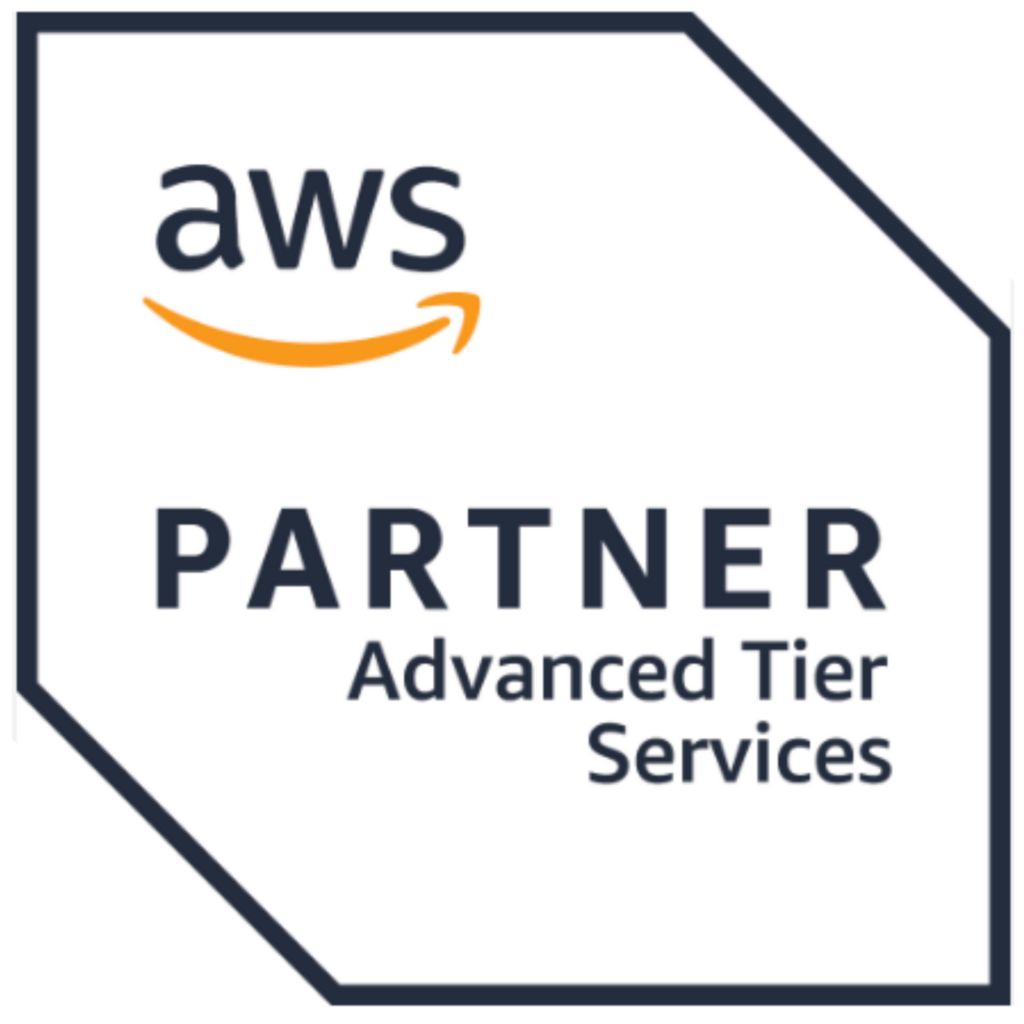
PITTSBURGH, PA – August 28, 2024 – River Point Technology (RPT), an award-winning cloud consulting and enablement provider, today announced it has achieved Amazon Web Services (AWS) Advanced Tier Services Partner status within the AWS Partner Network (APN). This prestigious designation recognizes River Point Technology’s deep expertise in AWS technologies and proven success in helping the Fortune 500 accelerate their digital transformation journeys.
As an AWS Advanced Tier Services Partner, River Point Technology offers strategic guidance on complex cloud migrations, optimizes system architecture, and delivers innovative solutions to enterprises. With direct access to AWS premium support, River Point Technology can ensure rapid problem resolution and minimize downtime. Its advanced knowledge of AWS pricing and cost management tools optimizes client cloud spend, while its expertise in security ensures compliance with industry standards and access to new AWS features keeps clients at the forefront of innovation.
Leveraging its cloud expertise, River Point Technology is pioneering the integration of advanced generative AI technologies within the AWS ecosystem to drive enterprise-wide transformation. The firm leverages AWS’s robust infrastructure and services to develop and implement several AI-driven solutions that are reshaping how organizations operate:
- Enterprise–wide conversational artificial intelligence and voice technology: Leveraging AI to boost revenue generation, reduce operational costs, and enhance customer support and advocacy.
- AI for Anomaly Detection: Utilizing AI to detect irregularities in operations, providing organizations with the insights needed to proactively address issues before they escalate.
- Self-Aware AI: Implementing cutting-edge self-aware AI systems that adapt and evolve, enabling more intuitive and responsive decision-making across enterprise environments.
- AI for network monitoring, management, and remediation at scale: Offering AI-driven solutions that monitor, manage, and automatically remediate network issues, ensuring optimal performance and reducing downtime.
“Achieving AWS Advanced Tier Services Partner status is a testament to our team’s dedication and expertise in helping enterprises harness the full potential of AWS,” said Jeff Eiben, CEO of River Point Technology. “This recognition combined with our application specific generative AI initiatives not only validates our technical capabilities but also reinforces our unique approach to cloud enablement. Through our trademarked Value Creation Technology (VCT) process and comprehensive RPT Accelerator programs, we’re empowering organizations to redefine what’s possible in their cloud journey and achieve lasting Day 2 success.”
River Point Technology’s success with AWS builds on a proven track record of helping enterprises across industries optimize their cloud investments, streamline operations, and accelerate digital transformation. With a comprehensive suite of services, River Point Technology is a trusted partner for organizations seeking to maximize the value of their AWS deployments and achieve sustained growth.
The AWS Advanced Tier Services Partner status is awarded to companies that demonstrate high levels of technical proficiency, have extensive experience in deploying customer solutions on AWS, and have a strong team of AWS-certified professionals. River Point Technology’s achievement of this status underscores its commitment to delivering innovative cloud solutions and its ability to drive transformative growth for clients leveraging the AWS ecosystem.
About River Point Technology
River Point Technology (RPT) is an award-winning cloud consulting, training, and enablement provider, that partners with the Fortune 500 to accelerate their digital transformation journeys and redefine the art of the possible. Our world-class team of IT, cloud, and DevOps experts helps organizations leverage the cloud for transformative growth through prescriptive methodologies, best-in-class services, and our trademarked Value Creation Technology process. From consulting and training to comprehensive year-long RPT Accelerator programs, River Point Technology empowers enterprises to achieve Day 2 success in the cloud and maximize their technology investments. Our innovative generative AI solutions further drive operational excellence and competitive advantage for our clients. For more information, visit www.riverpointtechnology.com
Contact: Laura Barton, lbarton@riverpointtechnology.com, (310) 947-6242
###
By: Ben Lykins, RPT Solutions Architect
Introduction
The following will walk through the necessary steps to deploy NueVector via Helm. This can be done locally or on a virtual machine. I am using minikube to test on, but K3S/MicroK8s or any other distros will work. Since this is going to be scaled down, we will also limit replicas. The purpose of this guide is for testing and not intended for any production usage. Consult the official documentation for more information : SUSE NeuVector Docs.
What is SUSE NeuVector?
SUSE NeuVector, the leader in Full Lifecycle Container Security, delivers uncompromising end-to-end security for modern container infrastructures. SUSE NeuVector offers a cloud-native Kubernetes security platform with end-to-end vulnerability management, automated CI/CD pipeline security, and complete run-time security, including the industry’s only container firewall to block zero days and other threats.
What is Multipass?
Multipass is a tool to generate cloud-style Ubuntu VMs quickly on Linux, macOS, and Windows.It gives you a simple but powerful CLI that allows you to quickly access an Ubuntu command line or create your own local mini-cloud. Developers can use Multipass to prototype cloud deployments and to create fresh, customized Linux dev environments on any machine. Mac and Windows users can use Multipass as the quickest way to get an Ubuntu command line on their system. New Ubuntu users can use it as a sandbox to try new things without affecting their host machine, and without the need to dual boot.
Prerequisites
Required:
- A local or virtual machine with a K8S distro for testing.
- I will use
multipass, which can launch an instance with minikube already installed.
- I will use
Set up Virtual Machine
Since I have multipass installed, I will launch a new vm using the existing minikube image.
Run:
multipass launch -c 8 -m 16G -n demo minikubeOnce completed, you should get a launched.
multipass launch -c 8 -m 16G -n demo minikube
Launched: demoRunning a multipass list, will output all the launched virtual machines.
demo Running 192.168.64.20 Ubuntu 22.04 LTS
172.17.0.1
192.168.49.1NeuVector Setup
Connect to the virtual machine, you will run multipass shell demo.
Following is an example when you shell into the VM:
Welcome to Ubuntu 22.04.3 LTS (GNU/Linux 5.15.0-92-generic aarch64)
* Documentation: https://help.ubuntu.com
* Management: https://landscape.canonical.com
* Support: https://ubuntu.com/pro
System information as of Thu Feb 29 09:16:40 EST 2024
System load: 1.5546875
Usage of /: 13.2% of 38.59GB
Memory usage: 6%
Swap usage: 0%
Processes: 199
Users logged in: 0
IPv4 address for br-1746f5f95e03: 192.168.49.1
IPv4 address for docker0: 172.17.0.1
IPv4 address for enp0s1: 192.168.64.20
IPv6 address for enp0s1: fd3c:28b:5cc5:4064:5054:ff:fe87:5beNeuVector Setup – minikube
minikube is already started on the new instance; however, I am going to bump up CPUs and Memory for it.
If needing to install minikube, check out the documentation.
First, stop minikube:
Run:
minikube stop
Example Output:
ubuntu@demo:~$ minikube stop
✋ Stopping node "minikube" ...
???? Powering off "minikube" via SSH ...
???? 1 node stopped.Update CPUs:
Run:
minikube config set cpus 4
Example Output:
ubuntu@demo:~$ minikube config set cpus 4
❗ These changes will take effect upon a minikube delete and then a minikube startUpdate Memory:
Run:
minikube config set memory 8192
Example Output:
ubuntu@demo:~$ minikube config set memory 8192
❗ These changes will take effect upon a minikube delete and then a minikube startDelete exiting minikube:
In order for the configuration changes to be made, minikube needs to be deleted and recreated.
Run:
minikube delete
Example Output:
ubuntu@demo:~$ minikube delete
???? Deleting "minikube" in docker ...
???? Deleting container "minikube" ...
???? Removing /home/ubuntu/.minikube/machines/minikube ...
???? Removed all traces of the "minikube" cluster.Run:
minikube start
Example Output:
ubuntu@demo:~$ minikube start
???? minikube v1.32.0 on Ubuntu 22.04 (arm64)
✨ Automatically selected the docker driver. Other choices: ssh, none
???? Using Docker driver with root privileges
???? Starting control plane node minikube in cluster minikube
???? Pulling base image ...
???? Creating docker container (CPUs=4, Memory=8192MB) ...
???? Preparing Kubernetes v1.28.3 on Docker 24.0.7 ...
▪ Generating certificates and keys ...
▪ Booting up control plane ...
▪ Configuring RBAC rules ...
???? Configuring bridge CNI (Container Networking Interface) ...
▪ Using image gcr.io/k8s-minikube/storage-provisioner:v5
???? Verifying Kubernetes components...
???? Enabled addons: storage-provisioner, default-storageclass
???? Done! kubectl is now configured to use "minikube" cluster and "default" namespace by defaultminikube should be up running, once connected. Check its status by doing the following.
Run:
minikube status
Example Output:
ubuntu@demo:~$ minikube status
minikube
type: Control Plane
host: Running
kubelet: Running
apiserver: Running
kubeconfig: ConfiguredIf looking to play with minikube more, there are additional add-ons which can be installed, in this case, we will leave the defaults, but metrics-server and dashboard are typical.
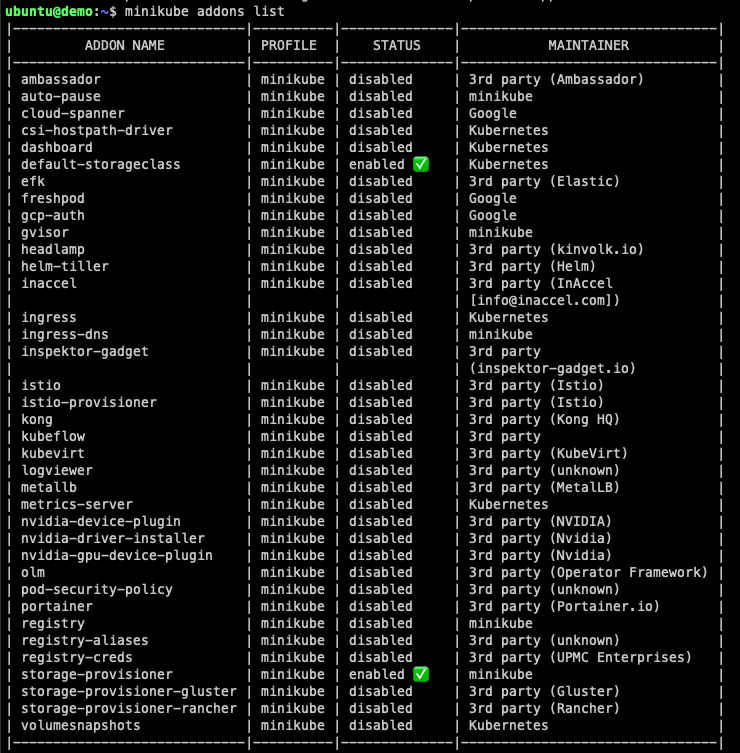
NeuVector Setup – kubectl
This image also comes with kubectl setup:
ubuntu@demo:~$ kubectl version
Client Version: v1.28.7
Kustomize Version: v5.0.4-0.20230601165947-6ce0bf390ce3
Server Version: v1.28.3NeuVector Setup – helm
Helm is not installed, but can be quickly set up:
ubuntu@demo:~$ helm version
Command 'helm' not found, but can be installed with:
sudo snap install helmTo install, run:
sudo snap install helm --classic
Example Output:
ubuntu@demo:~$ sudo snap install helm --classic
Download snap "core22" (1125) from channel "stable"Once install is complete, you can check the version with helm version:
ubuntu@demo:~$ helm version
version.BuildInfo{Version:"v3.14.2", GitCommit:"c309b6f0ff63856811846ce18f3bdc93d2b4d54b", GitTreeState:"clean", GoVersion:"go1.21.7"}NeuVector Setup – Helm Install
Add the helm repo, run:
helm repo add neuvector https://neuvector.github.io/neuvector-helm/For this, I’m going to use the latest version, but other older versions and development version can be listed:
helm search repo neuvector --devel -lWhen this was originally written, the latest as of 29 February 2024 — Leap Day!:
ubuntu@demo:~$ helm search repo neuvector
NAME CHART VERSION APP VERSION DESCRIPTION
neuvector/core 2.7.3 5.3.0 Helm chart for NeuVector's core services
neuvector/crd 2.7.3 5.3.0 Helm chart for NeuVector's CRD services
neuvector/monitor 2.7.3 5.3.0 Helm chart for NeuVector monitor servicesHelm Install:
For setting up NeuVector, it is simple enough that I will keep most of the default values. I am updating the controller and scanner replicas, if leaving the defaults it will nuke your system since minikube is running a single node. This is fine for local and development environments, run the following:
helm upgrade --install neuvector neuvector/core --version 2.7.6 \
--set tag=5.3.2 \
--set controller.replicas=1 \
--set cve.scanner.replicas=1 \
--create-namespace \
--namespace neuvectorThe readme for the repository will provide additional configuration options:
When running:
ubuntu@demo:~$ helm upgrade --install neuvector neuvector/core --version 2.7.6 \
--set tag=5.3.2 \
--set controller.replicas=1 \
--set cve.scanner.replicas=1 \
--create-namespace \
--namespace neuvector
Release "neuvector" does not exist. Installing it now.
NAME: neuvector
LAST DEPLOYED: Thu Feb 29 09:34:30 2024
NAMESPACE: neuvector
STATUS: deployed
REVISION: 1
TEST SUITE: None
NOTES:
Get the NeuVector URL by running these commands:
NODE_PORT=$(kubectl get --namespace neuvector -o jsonpath="{.spec.ports[0].nodePort}" services neuvector-service-webui)
NODE_IP=$(kubectl get nodes --namespace neuvector -o jsonpath="{.items[0].status.addresses[0].address}")
echo https://$NODE_IP:$NODE_PORTAfter running helm to install NeuVector, it will take some time for all of the nodes to come up and be stable. When all the pods are up and running and stable, then we should be good to try connecting.
Run:
kubectl get pods -n neuvector
Example Output:
NAME READY STATUS RESTARTS AGE
neuvector-controller-pod-554d868cbd-4sk54 1/1 Running 0 3m15s
neuvector-enforcer-pod-gqhsv 1/1 Running 2 (63s ago) 3m15s
neuvector-manager-pod-8589675984-7pl2j 1/1 Running 0 3m15s
neuvector-scanner-pod-5bb668cc99-r7vkq 1/1 Running 0 3m15Accessing the NeuVector User Interface
I am going to port-forward this and access it from my local browser. On the virtual machine, run the following command.
kubectl port-forward --address 0.0.0.0 --namespace neuvector service/neuvector-service-webui 8443
Example Output:
ubuntu@demo:~$ kubectl port-forward --address 0.0.0.0 --namespace neuvector service/neuvector-service-webui 8443
Forwarding from 0.0.0.0:8443 -> 8443This will listen on port 8443 on all addresses (0.0.0.0) and forward to the service : neuvector-service-webui.
Accessing Locally
On you local browser, go to the following, https://ipaddress:8443.
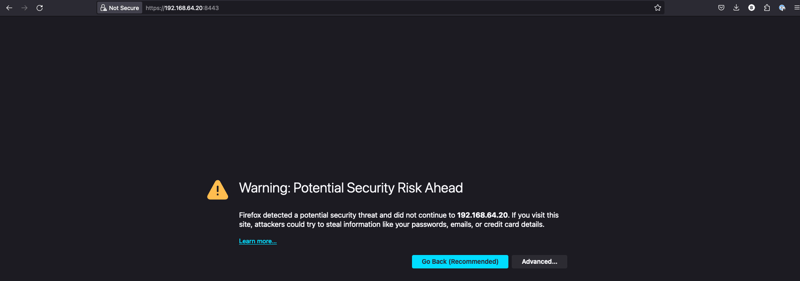
Please Note: the IP Address I pulled is the virtual machine’s private IP address. This can be checked again using
multipass list.
multipass list
Example Output:
Name State IPv4 Image
demo Running 192.168.64.20 Ubuntu 24.04 LTS
172.17.0.1
192.168.49.1Since this is a self-signed certificate, you can ignore the warnings and proceed.
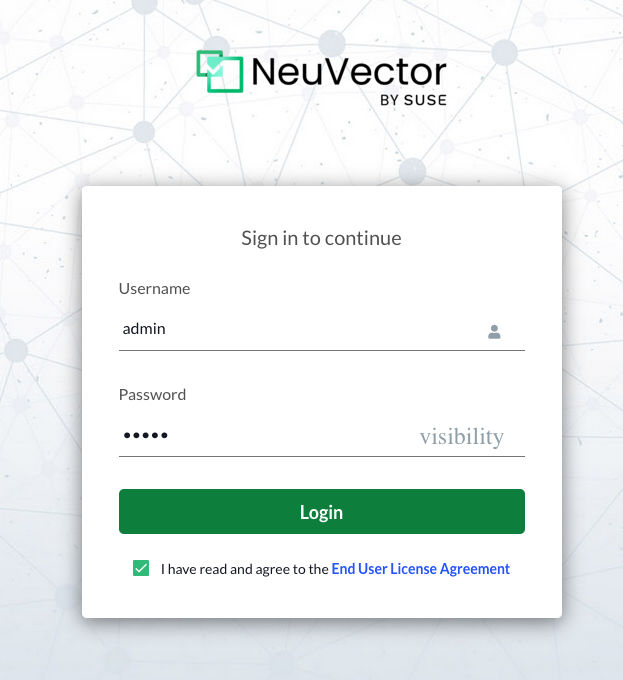
By default, username and password are admin:admin.
Check off on the EULA and you can login.
And voila, update admin password if you plan will continue to use this and you are done.
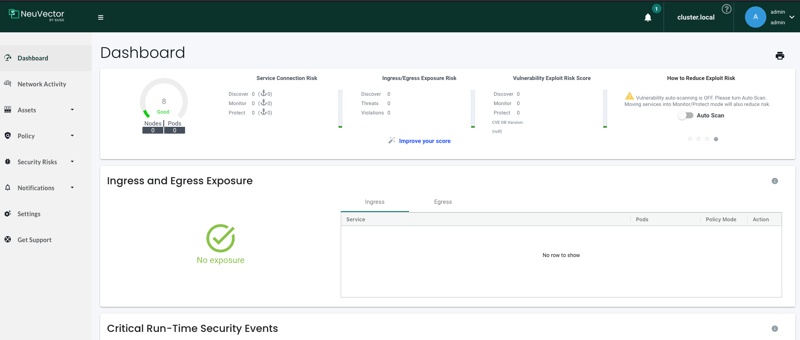
Additional Steps – Set up mysql container
If looking to test NeuVector a bit more, we will add a MySQL service and run scans on containers and nodes with the NeuVector console.
Add the bitnami repo:
helm repo add bitnami https://charts.bitnami.com/bitnamiInstall:
helm install bitnami/mysql --generate-nameIn NeuVector Interface
Go to Assets in the navigation pane on the left and select the dropdown. From the dropdown, select containers.
Turn on Auto Scan or perform a manual scan:
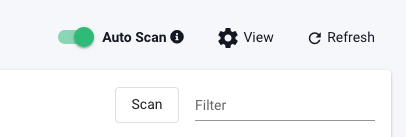
Auto Scanning:

Scans will schedule and return back results on completed. Depending on the amount of resources, both scanners and containers, it could take time. Since this is a new cluster, it is relatively quick.

You can filter and view the vulnerabilities which are found:
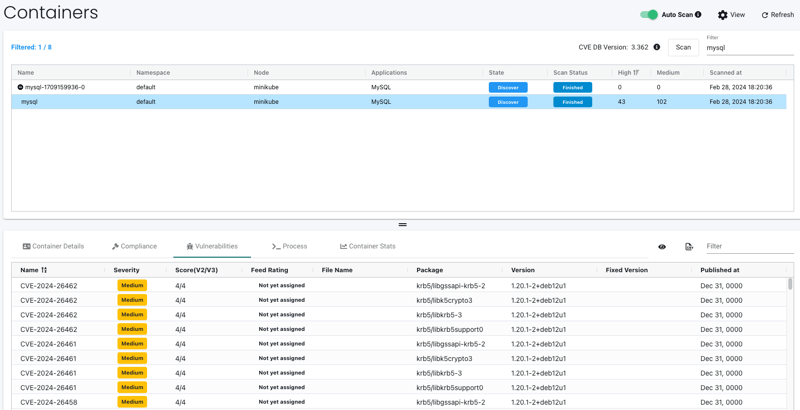
Go to the Nodes page:

You can see the nodes are also scanned as well for vulnerabilities.
Conclusion
That is about it, a quick and easy way to test out NeuVector. This is really just scratching the surface when it comes to what features and solutions it offers.
Award-Winning Cloud Consulting, Training & Enablement Provider Lures Industry Leaders
Pittsburgh, PA – April 16, 2024 (Newswire) – River Point Technology (RPT), an award-winning cloud consulting, training, and enablement provider, today formally announced the addition of two industry leaders to its management team to support continued high growth. RPT has named Dane Smith, Managing Director of Global Client Engagement, and Steve Pantol, VP Service Delivery, bringing their years of experience to bolster an existing high-end team.
Welcome Dane Smith, Managing Director of Global Client Engagement
Dane Smith brings over thirty years of experience building and leading sales organizations from Sun Microsystems to VMware. He has achieved success in the startup world where he has been a founding member, board advisor, and investor and had the good fortune to be a part of multiple exits. Most recently Dane helped lead computer science and data science innovation, entrepreneurship, and startups at the University of Chicago’s Polsky Center. Dane’s comprehensive experience will bring a strong focus to RPT in growing the intellectual property portfolio and RPT’s value proposition to its global F1000 customers and partners.
Welcome Steve Pantol, VP Service Delivery
Steve Pantol joins RPT as a leader with a track record of building and scaling services organizations. Steve led the development of the Cloud Services team at a large solutions integrator and more recently supported scaling the cloud native consulting group at VMware that became VMware Tanzu Labs following VMware’s acquisition of Pivotal. The successes of executing on these high growth roles will bring critical experience to RPT to support our clients’ needs as they progress through their digital transformation journeys.
Jeff Eiben, CEO of RPT, stated, “I couldn’t be more excited to bring the level of talent that Dane and Steve possess to RPT. Their industry knowledge will bring immediate value to our clients, partners, and team. My main criteria in adding executive talent to RPT was for leaders that have had a demonstrated record of accomplishment and can hit the ground running in support of our company goals. With these additions to our high-end team, strong intellectual capital and a F1000 client base of household names, we can continue to be laser focused on successful customer outcomes.”
River Point Technology’s award-winning team, comprised of some of the world’s best IT, cloud, and DevOps experts, delivers a comprehensive suite of consulting offerings, including:
- Cloud management: Optimization of cloud resources for cost efficiencies & operational excellence.
- Application modernization: State-of-the-art solutions help you develop faster & better.
- Digital transformation: Our experts guide you on the journey & give you the competitive edge.
- Agile DevOps: Our robust DevOps practices result in faster dev cycles & enhanced software quality.
- Continuous Improvement & Delivery (CI/CD): We help drive operational efficiency to optimal return on tech investment.
Through its 5-star rated training programs on leading cloud platforms, RPT equips teams with the necessary skills to excel in the cloud. Additionally, the company’s flagship offering, the RPT Accelerator, is a subscription-based enablement program that helps enterprises achieve Day 2 success in the cloud, ensuring ongoing optimization and value realization.
With its unparalleled expertise and dedication to customer success, RPT is poised to continue leading the way in cloud consulting and enablement. By empowering organizations to leverage the cloud effectively, RPT helps them achieve their full potential and accelerate their digital transformation journeys.
About River Point Technology: River Point Technology (RPT) is an award-winning cloud consulting, training, and enablement provider, partnering with the Fortune 500 to accelerate their digital transformation and infrastructure automation journeys and redefine the art of the possible. Our world-class team of IT, cloud, and DevOps experts helps organizations leverage the cloud for transformative growth through prescriptive methodologies, best- in-class services, and our trademarked Value Creation Technology process. From consulting and training to comprehensive year-long RPT Accelerator programs, River Point Technology empowers enterprises to achieve Day 2 success in the cloud and maximize their technology investments.